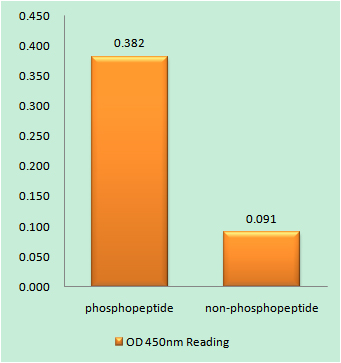PRAS40 Polyclonal Antibody
- 货号:YT3850
- 应用:WB;IHC;IF;ELISA
- 种属:Human;Mouse;Rat
- 简介:
- >>Autophagy - animal;>>mTOR signaling pathway;>>AMPK signaling pathway;>>Longevity regulating pathway;>>Longevity regulating pathway - multiple species;>>Thermogenesis;>>Shigellosis
- 蛋白名称:
- Proline-rich AKT1 substrate 1
- 免疫原:
- The antiserum was produced against synthesized peptide derived from human Akt1 S1. AA range:207-256
- 特异性:
- PRAS40 Polyclonal Antibody detects endogenous levels of PRAS40 protein.
- 组成:
- Liquid in PBS containing 50% glycerol, 0.5% BSA and 0.02% sodium azide.
- 来源:
- Polyclonal, Rabbit,IgG
- 稀释:
- WB 1:500 - 1:2000. IHC 1:100 - 1:300. ELISA: 1:5000.. IF 1:50-200
- 纯化工艺:
- The antibody was affinity-purified from rabbit antiserum by affinity-chromatography using epitope-specific immunogen.
- 储存:
- -15°C to -25°C/1 year(Do not lower than -25°C)
- 其他名称:
- AKT1S1;PRAS40;Proline-rich AKT1 substrate 1;40 kDa proline-rich AKT substrate
- 背景:
- AKT1S1 is a proline-rich substrate of AKT (MIM 164730) that binds 14-3-3 protein (see YWHAH, MIM 113508) when phosphorylated (Kovacina et al., 2003 [PubMed 12524439]).[supplied by OMIM, Mar 2008],
- 功能:
- function:May play an important role in phosphatidylinositol 3-kinase (PI3K)-AKT1 survival signaling. Substrate for AKT1 phosphorylation, but can also be activated by AKT1-independent mechanisms. Its role in survival signaling pathways may be modulated by oxidative stress. May also play a role in nerve growth factor-mediated neuroprotection.,subcellular location:Found in the cytosolic fraction of the brain.,subunit:The phosphorylated form interacts with 14-3-3.,tissue specificity:Widely expressed with highest levels of expression in liver and heart. Expressed at higher levels in cancer cell lines (e.g. A549 and HeLa) than in normal cell lines (e.g. HEK293).,
- 细胞定位:
- Cytoplasm, cytosol . Found in the cytosolic fraction of the brain. .
- 组织表达:
- Widely expressed with highest levels of expression in liver and heart. Expressed at higher levels in cancer cell lines (e.g. A-549 and HeLa) than in normal cell lines (e.g. HEK293).

